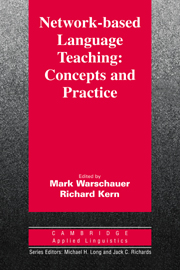Book contents
- Frontmatter
- Contents
- List of contributors
- Series editors' preface
- Preface
- 1 Introduction: Theory and practice of network-based language teaching
- 2 Sociocollaborative language learning in Bulgaria
- 3 On-line learning in second language classrooms: An ethnographic study
- 4 Negotiation in cyberspace: The role of chatting in the development of grammatical competence
- 5 Writing into change: Style shifting in asynchronous electronic discourse
- 6 Computers and collaborative writing in the foreign language curriculum
- 7 Networked multimedia environments for second language acquisition
- 8 An electronic literacy approach to network-based language teaching
- 9 Task-based language learning via audiovisual networks: The LEVERAGE project
- 10 Is networked-based learning CALL?
- Name index
- Subject index
4 - Negotiation in cyberspace: The role of chatting in the development of grammatical competence
Published online by Cambridge University Press: 05 October 2012
- Frontmatter
- Contents
- List of contributors
- Series editors' preface
- Preface
- 1 Introduction: Theory and practice of network-based language teaching
- 2 Sociocollaborative language learning in Bulgaria
- 3 On-line learning in second language classrooms: An ethnographic study
- 4 Negotiation in cyberspace: The role of chatting in the development of grammatical competence
- 5 Writing into change: Style shifting in asynchronous electronic discourse
- 6 Computers and collaborative writing in the foreign language curriculum
- 7 Networked multimedia environments for second language acquisition
- 8 An electronic literacy approach to network-based language teaching
- 9 Task-based language learning via audiovisual networks: The LEVERAGE project
- 10 Is networked-based learning CALL?
- Name index
- Subject index
Summary
Introduction
Recent technological advancements in network-based communication (NBC) hold special promise for second and foreign language teachers and learners, as they provide for connectivity between a wider range of speakers than previously believed possible. Particularly promising among the various forms of NBC are those that allow for synchronous, real-time communication, the obvious advantage being that messages are typed, sent, and received instantaneously, bringing the electronic communicative exchanges from the static to the more dynamic, and thus more closely resembling oral interaction. Communication through synchronous NBC has even been dubbed “chatting,” further underscoring its resemblance to oral interaction. Because oral interaction is considered by many to be important for second language development, and because synchronous NBC, such as chatting, bears a striking resemblance to oral interaction, it seems logical to assume that language practice through NBC will reap some of the same benefits for second language development as practice through oral interaction. While interesting, this assumption is nevertheless one that has yet to be fully explored. Specifically, there is no published research that demonstrates that NBC chatting holds the same potential for the development of grammatical competence as does oral interaction. Grammatical competence is defined by Canale and Swain (1980) as the knowledge of the features and rules of the language, including the lexicon, the syntax, and the semantics.
Information
- Type
- Chapter
- Information
- Network-Based Language Teaching: Concepts and PracticeConcepts and Practice, pp. 59 - 86Publisher: Cambridge University PressPrint publication year: 2000
Accessibility standard: Unknown
Why this information is here
This section outlines the accessibility features of this content - including support for screen readers, full keyboard navigation and high-contrast display options. This may not be relevant for you.Accessibility Information
- 131
- Cited by
